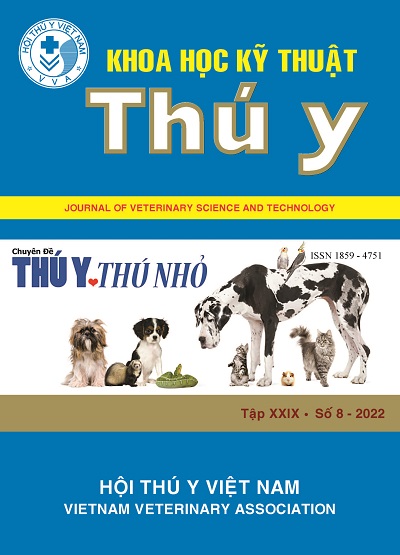Investigation on reasons and evaluating treatment efficacy for bone fracture in dogs
Abstract
In this study, the causal factors and treatment efficacy for bone fracture in dogs were investigated at Tin Tho Veterinary clinic in Binh Duong province from February to June 2021. According to records of 2,553 dogs, 66 (2.59%) were identified with bone lesions and categorized into four treatment groups: bone fixation surgery (34.85%), medical (25.75%), cast (19.70%),
and no therapy (19.70%). Foreign dog breeds fracture at a rate of 57.58% (38/66 dogs), which is greater than the domestic dog fracture rate of 42.42% (38/66 dogs). According to gender, 48/66 male dogs (72.73%) fractured more frequently than 18/66 female dogs (27.27%). Bone fractures occur more frequently in dogs under one year of age (53.03%) Bone fractures are more
common in dogs under one-year-old (53.03%) in domestic breeds than those in crossbreeds, with traffic accidents being the major cause of dog bone fracture. The limb bone fracture in dogs accounted for the highest rate (74.24%). The highest rate of bone fracture in dogs and cats was determined to be in the front limbs (53.06%), followed by the hind limbs (44.90%), and both front and hind limbs (2.04%). There were 23 cases treated by surgical methods (34.85%), 7 cases used the nailing internal fixation (30.43%), 6 cases used the external fixation (26.09%), 5 cases applied the combined internal and external fixation (21.74%), 4 cases removed the bone joints (17.39%) and 1 case used screws and splints (4.35%). There were 7 cases (19.44%) noted to be complications, whether connected to elderly canines or not taken care of properly, but no case died. Further research is needed to determine the key regulator of vascular remodelling in the repair of endothelial fractures, as well as the perfusion capacity in each treatment approach.

